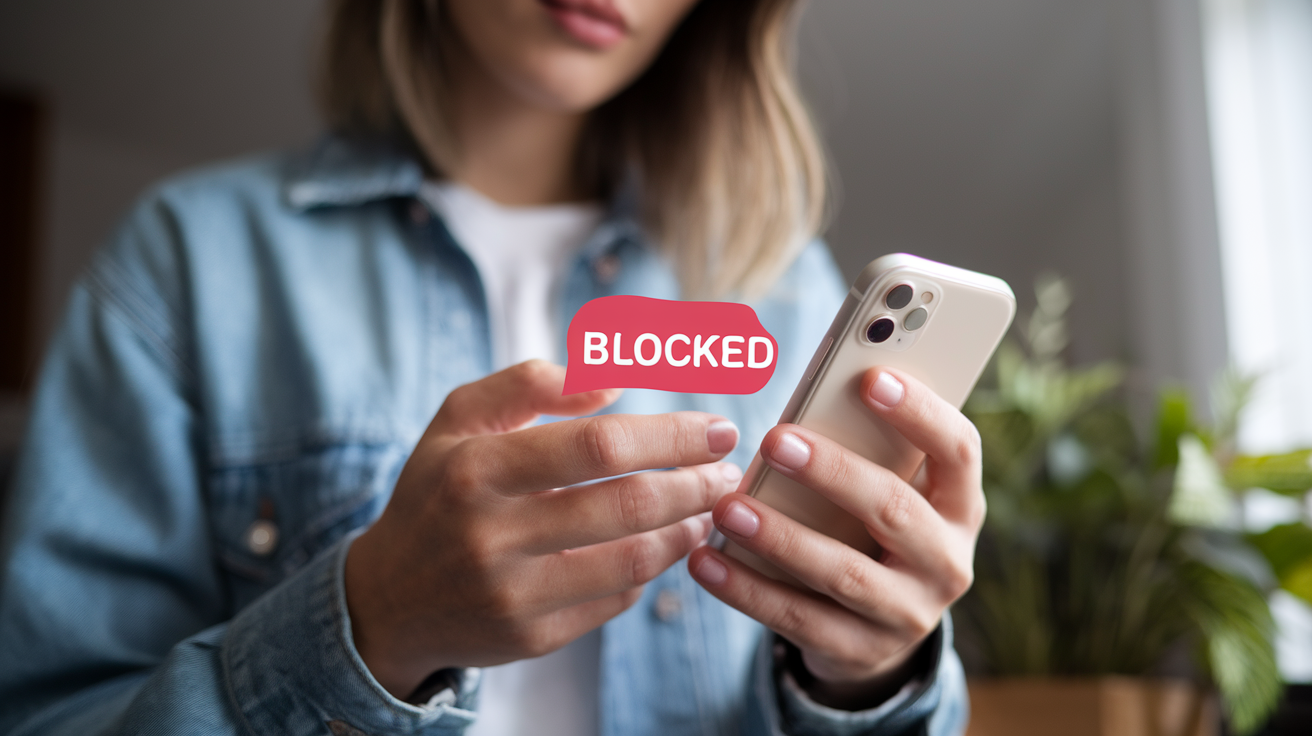Are you going through a breakup or dealing with issues healing yourself?
The moments after a split can feel like the longest days of your life. Each morning, you might check your phone, hoping to see their message.
But you need to know that staying in touch right after a breakup often makes healing harder.
One helpful way to heal is by using the 60-day no-contact rule. This approach encourages you to take a break from all communication with your ex, giving you space to reflect and move on.
You might wonder how this rule works or if it’s really effective.
In this blog, you’ll find simple steps to implement the no-contact rule in your life. Using these tips you will get to focus on yourself and move forward with confidence.
The Golden Rules of 60 Days No Contact

The 60-day no-contact rule has clear guidelines that you must follow. Think of these rules as your roadmap to healing.
First, you need to block your ex’s number and remove them from all social media. Yes, all of them – no exceptions!
Next, avoid places where you might run into them. This includes their workplace, favorite coffee shops, or gyms. Find new spots for yourself instead.
Don’t ask your mutual friends about your ex. When they bring up news about your ex, politely tell them you’d rather not hear it. This might feel hard, but it’s needed for your peace.
Delete or store away photos, gifts, and other reminders. Put them in a box and give it to a friend to keep. You don’t need these items triggering memories right now.
Lastly, if your ex reaches out, don’t respond. Even a simple “hi” can undo your progress. Stay strong and keep moving forward.
Remember, these rules aren’t about being mean. They’re about giving yourself space to heal and grow. Each day you follow them is a step toward feeling better.
Steps to Implement the 60-Day No Contact Rule

Here is the content restructured without bullet points:
1. Remove All Contact Options
Start by deleting their phone number from your contacts. It may feel tough, but keeping it only makes it more likely that you will reach out. Block them on all social media platforms for the time being. Seeing their posts or stories will only make you feel worse, and it’s important to distance yourself. Put away photos, gifts, and other items that remind you of them. Store them in a box and keep them out of sight so they don’t trigger unwanted emotions. It’s also a good idea to tell your close friends about your plan. They can offer support and help keep you on track, especially during weak moments when you might feel tempted to break the rule.
2. Set Clear Starting Rules
Mark your start date on a calendar. This will help you track your progress day by day, which can be motivating. Write down the reasons why you’re making this decision. Keep that list handy so you can read it whenever you feel the urge to break the rule. Keeping yourself busy with work or hobbies is especially helpful during the times you would normally talk to them. This will help fill the void and keep your mind occupied. It’s also useful to make a list of activities you can do when you miss them. Having these alternatives ready gives you a distraction and keeps you from reaching out.
3. Create a Daily Routine
It’s important to wake up at the same time each day. A consistent schedule helps you stay focused and adds stability to your life. Adding daily exercise or walking can also be beneficial, as physical activity naturally lifts your mood. Plan your meals ahead of time. Proper nutrition ensures that you have the energy you need to get through the tough moments. Set aside time for things you enjoy, be it it’s reading, hobbies, or simply relaxing. This reinforces the idea that life continues, and you are moving forward.
4. Handle the Urge to Contact
When you feel the urge to reach out, try writing down your feelings in a journal instead of texting them. This offers a safe space for emotional release without taking actions you may regret. If you’re feeling lonely, calling a friend can be a great option. Good friends will listen without judgment and provide the support you need. Going for a walk when you’re stuck in your thoughts about them is another useful technique. Movement helps clear your mind and break the cycle of overthinking. Remember why you made this decision in the first place. The urge to contact them usually passes within 30 minutes, so stay focused on your goal.
5. Focus on Personal Growth
Take the time to learn something new that interests you. It could be cooking, painting, or exploring a different hobby. This will keep your mind engaged and focused on your own growth. Spending more time with family and friends who support you is also important. They will help reinforce your decision and encourage you through the process. Don’t forget to take better care of yourself. Ensure you’re getting enough sleep and eating well, as this supports your physical and emotional health. Additionally, making small plans for your future helps you look beyond the breakup and focus on new possibilities.
6. Prepare for the End of 60 Days
As you near the end of the 60-day period, reflect on how you feel now compared to when you started. Take note of your progress and acknowledge how far you’ve come. If you feel that you’re not quite ready to move on, it’s okay to extend the period. There’s no rush. Think about what you’ll do after day 60. Having a clear plan for the next steps will help you maintain strength and stay focused on your future. Lastly, be proud of yourself for making it through. Completing this process demonstrates your inner strength and resilience.
How to Cope During the 60 Days
| Week | What You Might Feel | How to Handle It |
|---|---|---|
| Week 1-2 | Strong urge to call or text, lots of sad feelings, trouble sleeping, missing daily chats | Keep your phone in another room, talk to a close friend daily, try simple breathing exercises, write down your feelings |
| Week 3-4 | Lonely moments hit hard, questions about their life, memory triggers pop up, mixed feelings about the rule | Join a local club or group, focus on a home project, change your room layout, keep a daily success diary |
| Week 5-6 | Better sleep starts, less crying spells, random sad moments, and some good days appear | Start a new workout plan, learn to cook new meals, read helpful books, meet new people |
| Week 7-8 | More energy comes back, clearer thinking, less time spent wondering, growing confidence | Plan weekend activities, try a new hobby, help others who struggle, notice your progress |
| Final 2 Weeks | Lighter feelings show up, more smiles return, the future looks brighter, and self-trust grows | Make future plans, thank your support team, list your growth points, and feel proud of yourself |
Benefits of the 60-Day No Contact Rule

Clear Mental Space: Your mind gets time to think without their input. You start seeing the relationship from a new angle and understand things better.
Better Self-Control: Each day without contact builds your willpower. You learn to handle tough feelings without reaching for your phone.
Emotional Recovery: Your feelings become more steady. The ups and downs get smaller, and you find your emotional balance again.
Fresh Interests: You find time to try new things. Old hobbies come back to life, and you spot new activities that bring joy.
Stronger Self-Worth: You see that you can live well on your own. Your confidence grows as each day passes.
Improved Decision-Making: Without daily contact, you make choices for yourself. Your judgment gets clearer and more focused.
Healthier Boundaries: You learn what limits feel right for you. This helps in all your relationships, not just romantic ones.
Real Healing: The break gives your heart true healing time. Quick fixes fade, but this creates lasting change.
Personal Growth: You find out who you are without them. Small wins each day add up to big personal changes.
Future Readiness: After 60 days, you’re better set for what’s next. Either way, you’re stronger than when you started.
Reconnecting After the 60 Days

Moving forward after 60 days needs careful thought. Let me share some key points about making contact again if you choose to do so.
First, check your feelings. Are you reaching out because you’ve healed or just because you miss them? Your answer matters a lot. Take time to write down your reasons.
Remember, you have options. You can extend your no-contact time if you need more space. There’s no rule that says you must reach out after 60 days.
If you decide to make contact, start small. A simple message works better than a long letter. Keep it light and short. You might say what you learned during this time.
Watch how they respond. If they don’t reply, respect that choice. If they do, take things slowly. Quick replies don’t mean rushing back to old patterns.
Pay attention to how you feel during these talks. Do you stay calm? Does your day still go well without their response? These signs show your healing progress.
Set new limits that work for you. You’ve grown in these 60 days. Your new boundaries matter. Hold onto the strength you’ve built.
Remember, good or bad, their response doesn’t define your worth. You’ve done the hard work of healing. That’s what counts most.
Pro Tip: Keep a small note on your phone that says, “I’m worth the wait” or “Just for today.” Read it when temptation hits.
Mistakes to Avoid During the 60-Day No Contact Rule
- Looking at their social media posts when you feel alone at night.
- Asking mutual friends about their life and daily activities.
- Keeping old text messages to read when you miss them.
- Making fake social media accounts to check their updates.
- Driving past their home or work “just to see” how they’re doing.
- Write long messages, but do not send them (delete them instead).
- Breaking the rule “just this once” because you had a bad day.
- Using friends to pass messages to them indirectly.
- Posting things online, hoping they’ll see and respond.
- Counting days until you can contact them instead of focusing on healing.
Each of these mistakes can slow down your healing. When you catch yourself doing any of these, pause and remind yourself why you started this rule.
What if You Break the Rule?

Don’t panic – breaking the rule doesn’t erase your progress. Here’s what to do:
Step 1: Stop Right Away
- End the contact immediately
- Don’t send follow-up messages
- Close social media apps
Step 2: Be Kind to Yourself
- Accept that slip-ups happen
- Don’t blame yourself harshly
- Take a deep breath
Step 3: Reset and Restart
- Start your counter fresh
- Write down what led to the contact
- Plan how to handle it better next time
Step 4: Make Changes
- Add new blocks if needed
- Tell a friend what happened
- Change your daily routine a bit
Step 5: Learn From It
- Notice what triggered you
- Write down your feelings before contact
- Use this knowledge to stay stronger
Remember: Starting over isn’t failing. Each attempt teaches you something new about yourself. Pick up where you left off, and keep moving forward.
Conclusion
Breaking up hurts, but the 60-day no-contact rule gives you space to heal properly. I’ve shown you the steps, benefits, and ways to handle this time. Think of these 60 days as a gift to yourself – a chance to grow stronger and wiser.
Remember, this rule isn’t about punishing anyone. It’s about giving yourself time to think clearly and feel better. Even if you choose to reconnect or move forward alone after 60 days, you’ll be in a better place to make that choice.
Ready to start your 60-day journey?
Pick a date, set your rules, and take that first step. You’re braver than you know, and each day makes you stronger.








